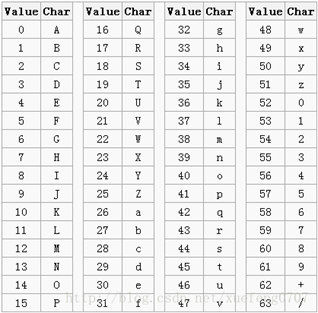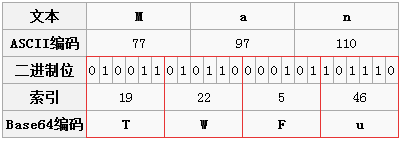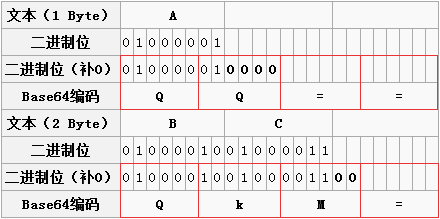BASE64编码解码
1 Base64编码概述
Base64是一种编码方式,这个术语最初是在“MIME内容传输编码规范”中提出的。Base64不是一种加密算法,它实际上是一种“二进制转换到文本”的编码方式,它能够将任意二进制数据转换为ASCII字符串的形式,以便在只支持文本的环境中也能够顺利地传输二进制数据。
(1)base64编码:把二进制数据转为字符
(2)base64解码:把字符转为二进制数据
2 Base64编码由来
因为有些网络传输渠道并不支持所有字节,例如传统的邮件只支持可见字符的传输,像ASCII码的控制字符(ASCII码包含了 128 个字符。其中前 32 个, 0-31 ,即 0x00-0x1F ,都是不可见字符。这些字符,就叫做控制字符。)就不能通过邮件传输。另外例如图片二进制流的每个字节不可能全部都是可见字符,所以就传送不了。
最好的方法就是在不改变传统协议的情况下,做一种扩展方案来支持二进制文件的传送,把不可能打印的字符用可打印的字符标识,问题就解决了。Base64编码就应运而生,Base64就是一种基于64个可打印字符来表示二进制数据的表示方法。
3 Base64编码原理
如下图Base64编码索引表,字符选用了“A-Z 、 a-z 、 0-9、+、 / ”64个可打印字符。数字代表字符索引,这个是标准Base64标准协议规定的,不能更改。64个字节用6个bit位就可以全部表示(32+16+8+4+2+1)就可以全部表示。这里注意一个Base64字符是8个bit,但有效部分只有右边6个bit,左边两个永远是0。

那么怎么用6个有效bit来表示传统字符的8个bit呢?8和6的最小公倍数是24,也就是说3个传统字节可以由4个Base64字符来表示,保证有效位数是一样的,这样就多了1/3的字节数来弥补Base64只有6个有效bit的不足。你也可以说用两个Base64字符也能表示一个传统字符,但是采用最小公倍数的方案其实是最减少浪费的。结合下边的图比较容易理解。Man是三个字符,一共24个有效bit,只好用4个Base64字符来凑齐24个有效位。红框表示的是对应的Base64,6个有效位转化成相应的索引值再对应Base64字符表,查出"Man"对应的Base64字符是"TWFU"。说到这里有个原则不知道你发现了没有,要转换成Base64的最小单位就是三个字节,对一个字符串来说每次都是三个字节三个字节的转换,对应的是Base64的四个字节。这个搞清楚了其实就差不多了。

但是转换到最后你发现不够三个字节了怎么办呢?愿望终于实现了,我们可以用两个Base64来表示一个字符或用三个Base64表示两个字符,像下图的A对应的第二个Base64的二进制位只有两个,把后边的四个补0就是了。所以A对应的Base64字符就是QQ。上边已经说过了,原则是Base64字符的最小单位是四个字符一组,那这才两个字符,后边补两个"="吧。其实不用"="也不耽误解码,之所以用"=",可能是考虑到多段编码后的Base64字符串拼起来也不会引起混淆。由此可见Base64字符串只可能最后出现一个或两个"=",中间是不可能出现"="的。下图中字符"BC"的编码过程也是一样的。

4 java代码实现
import java.io.UnsupportedEncodingException;
public class Base64 {
static private final int BASELENGTH = 255;
static private final int LOOKUPLENGTH = 64;
static private final int TWENTYFOURBITGROUP = 24;
static private final int EIGHTBIT = 8;
static private final int SIXTEENBIT = 16;
static private final int SIXBIT = 6;
static private final int FOURBYTE = 4;
static private final int SIGN = -128;
static private final byte PAD = (byte) '=';
static private byte[] base64Alphabet = new byte[BASELENGTH];
static private byte[] lookUpBase64Alphabet = new byte[LOOKUPLENGTH];
static {
for (int i = 0; i < BASELENGTH; i++) {
base64Alphabet[i] = -1;
}
for (int i = 'Z'; i >= 'A'; i--) {
base64Alphabet[i] = (byte) (i - 'A');
}
for (int i = 'z'; i >= 'a'; i--) {
base64Alphabet[i] = (byte) (i - 'a' + 26);
}
for (int i = '9'; i >= '0'; i--) {
base64Alphabet[i] = (byte) (i - '0' + 52);
}
base64Alphabet['+'] = 62;
base64Alphabet['/'] = 63;
for (int i = 0; i <= 25; i++)
lookUpBase64Alphabet[i] = (byte) ('A' + i);
for (int i = 26, j = 0; i <= 51; i++, j++)
lookUpBase64Alphabet[i] = (byte) ('a' + j);
for (int i = 52, j = 0; i <= 61; i++, j++)
lookUpBase64Alphabet[i] = (byte) ('0' + j);
lookUpBase64Alphabet[62] = (byte) '+';
lookUpBase64Alphabet[63] = (byte) '/';
}
public static boolean isBase64(String isValidString) {
return isArrayByteBase64(isValidString.getBytes());
}
public static boolean isBase64(byte octect) {
return (octect == PAD || base64Alphabet[octect] != -1);
}
public static boolean isArrayByteBase64(byte[] arrayOctect) {
int length = arrayOctect.length;
if (length == 0) {
// shouldn't a 0 length array be valid base64 data?
// return false;
return true;
}
for (int i = 0; i < length; i++) {
if (!Base64.isBase64(arrayOctect[i]))
return false;
}
return true;
}
public static String encode(String str) {
if (str == null)
return "";
try {
byte[] b = str.getBytes("UTF-8");
return new String(encode(b), "UTF-8");
} catch (UnsupportedEncodingException e) {
return "";
}
}
public static byte[] encodeStr2Byte(String str) {
if (str == null)
return null;
try {
byte[] b = str.getBytes("UTF-8");
return encode(b);
} catch (UnsupportedEncodingException e) {
return null;
}
}
public static String encodeByte2Str(byte[] bytes) {
if (bytes == null)
return "";
try {
return new String(encode(bytes), "UTF-8");
} catch (UnsupportedEncodingException e) {
return null;
}
}
/**
* Encodes hex octects into Base64.
*
* @param binaryData Array containing binary data to encode.
* @return Base64-encoded data.
*/
public static byte[] encode(byte[] binaryData) {
int lengthDataBits = binaryData.length * EIGHTBIT;
int fewerThan24bits = lengthDataBits % TWENTYFOURBITGROUP;
int numberTriplets = lengthDataBits / TWENTYFOURBITGROUP;
byte encodedData[] = null;
if (fewerThan24bits != 0) {
//data not divisible by 24 bit
encodedData = new byte[(numberTriplets + 1) * 4];
} else {
// 16 or 8 bit
encodedData = new byte[numberTriplets * 4];
}
byte k = 0, l = 0, b1 = 0, b2 = 0, b3 = 0;
int encodedIndex = 0;
int dataIndex = 0;
int i = 0;
for (i = 0; i < numberTriplets; i++) {
dataIndex = i * 3;
b1 = binaryData[dataIndex];
b2 = binaryData[dataIndex + 1];
b3 = binaryData[dataIndex + 2];
l = (byte) (b2 & 0x0f);
k = (byte) (b1 & 0x03);
encodedIndex = i * 4;
byte val1 =
((b1 & SIGN) == 0)
? (byte) (b1 >> 2)
: (byte) ((b1) >> 2 ^ 0xc0);
byte val2 =
((b2 & SIGN) == 0)
? (byte) (b2 >> 4)
: (byte) ((b2) >> 4 ^ 0xf0);
byte val3 =
((b3 & SIGN) == 0)
? (byte) (b3 >> 6)
: (byte) ((b3) >> 6 ^ 0xfc);
encodedData[encodedIndex] = lookUpBase64Alphabet[val1];
encodedData[encodedIndex + 1] =
lookUpBase64Alphabet[val2 | (k << 4)];
encodedData[encodedIndex + 2] =
lookUpBase64Alphabet[(l << 2) | val3];
encodedData[encodedIndex + 3] = lookUpBase64Alphabet[b3 & 0x3f];
}
// form integral number of 6-bit groups
dataIndex = i * 3;
encodedIndex = i * 4;
if (fewerThan24bits == EIGHTBIT) {
b1 = binaryData[dataIndex];
k = (byte) (b1 & 0x03);
byte val1 =
((b1 & SIGN) == 0)
? (byte) (b1 >> 2)
: (byte) ((b1) >> 2 ^ 0xc0);
encodedData[encodedIndex] = lookUpBase64Alphabet[val1];
encodedData[encodedIndex + 1] = lookUpBase64Alphabet[k << 4];
encodedData[encodedIndex + 2] = PAD;
encodedData[encodedIndex + 3] = PAD;
} else if (fewerThan24bits == SIXTEENBIT) {
b1 = binaryData[dataIndex];
b2 = binaryData[dataIndex + 1];
l = (byte) (b2 & 0x0f);
k = (byte) (b1 & 0x03);
byte val1 =
((b1 & SIGN) == 0)
? (byte) (b1 >> 2)
: (byte) ((b1) >> 2 ^ 0xc0);
byte val2 =
((b2 & SIGN) == 0)
? (byte) (b2 >> 4)
: (byte) ((b2) >> 4 ^ 0xf0);
encodedData[encodedIndex] = lookUpBase64Alphabet[val1];
encodedData[encodedIndex + 1] =
lookUpBase64Alphabet[val2 | (k << 4)];
encodedData[encodedIndex + 2] = lookUpBase64Alphabet[l << 2];
encodedData[encodedIndex + 3] = PAD;
}
return encodedData;
}
public static String decode(String str) {
if (str == null)
return "";
try {
byte[] b = str.getBytes("UTF-8");
return new String(decode(b), "UTF-8");
} catch (UnsupportedEncodingException e) {
return "";
}
}
public static byte[] decodeStr2Byte(String str) {
if (str == null)
return null;
try {
byte[] b = str.getBytes("UTF-8");
return decode(b);
} catch (UnsupportedEncodingException e) {
return null;
}
}
/**
* Decodes Base64 data into octects
*
* @param binaryData Byte array containing Base64 data
* @return Array containing decoded data.
*/
public static byte[] decode(byte[] base64Data) {
// handle the edge case, so we don't have to worry about it later
if (base64Data.length == 0) {
return new byte[0];
}
int numberQuadruple = base64Data.length / FOURBYTE;
byte decodedData[] = null;
byte b1 = 0, b2 = 0, b3 = 0, b4 = 0, marker0 = 0, marker1 = 0;
// Throw away anything not in base64Data
int encodedIndex = 0;
int dataIndex = 0;
{
// this sizes the output array properly - rlw
int lastData = base64Data.length;
// ignore the '=' padding
while (base64Data[lastData - 1] == PAD) {
if (--lastData == 0) {
return new byte[0];
}
}
decodedData = new byte[lastData - numberQuadruple];
}
for (int i = 0; i < numberQuadruple; i++) {
dataIndex = i * 4;
marker0 = base64Data[dataIndex + 2];
marker1 = base64Data[dataIndex + 3];
b1 = base64Alphabet[base64Data[dataIndex]];
b2 = base64Alphabet[base64Data[dataIndex + 1]];
if (marker0 != PAD && marker1 != PAD) {
//No PAD e.g 3cQl
b3 = base64Alphabet[marker0];
b4 = base64Alphabet[marker1];
decodedData[encodedIndex] = (byte) (b1 << 2 | b2 >> 4);
decodedData[encodedIndex + 1] =
(byte) (((b2 & 0xf) << 4) | ((b3 >> 2) & 0xf));
decodedData[encodedIndex + 2] = (byte) (b3 << 6 | b4);
} else if (marker0 == PAD) {
//Two PAD e.g. 3c[Pad][Pad]
decodedData[encodedIndex] = (byte) (b1 << 2 | b2 >> 4);
} else if (marker1 == PAD) {
//One PAD e.g. 3cQ[Pad]
b3 = base64Alphabet[marker0];
decodedData[encodedIndex] = (byte) (b1 << 2 | b2 >> 4);
decodedData[encodedIndex + 1] =
(byte) (((b2 & 0xf) << 4) | ((b3 >> 2) & 0xf));
}
encodedIndex += 3;
}
return decodedData;
}
public static void main(String[] args) {
String s = "测试信息lxw1234567890!@#$%^&*()_+";
System.out.println("原串: ");
System.out.println(s);
System.out.println("--------------------------------------------------");
String r = encode(s);
System.out.println("BASE64编码后: ");
System.out.println(r);
System.out.println("--------------------------------------------------");
String decode = decode(r);
System.out.println("BASE64解码后:");
System.out.println(decode);
System.out.println("--------------------------------------------------");
}
}